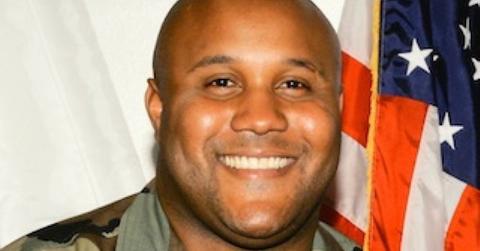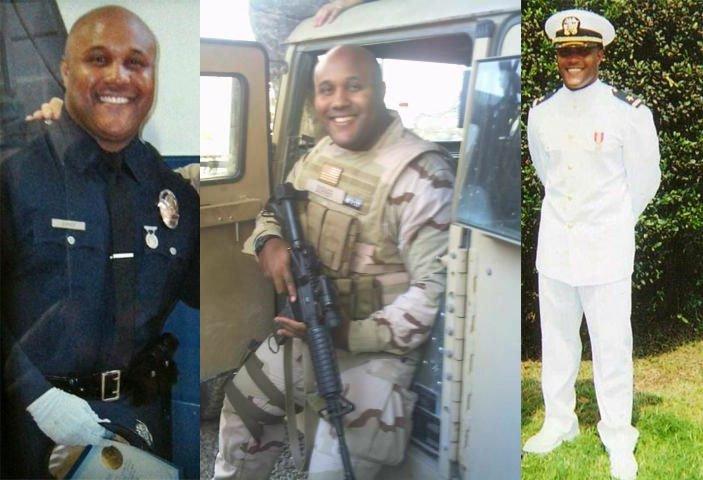Christopher Dorner Was Not Like the Cecil Hotel Serial Killers
Published Feb. 12 2021, 10:08 p.m. ET

2013 was a crazy year for Los Angeles, with complicated cases and conspiracies converging. In the first episode of Crime Scene: The Vanishing at the Cecil Hotel, the case of Christopher Dorner is mentioned, but not investigated in detail. The Cecil Hotel documentary investigates the Cecil Hotel’s long history of serial killers and unexplainable events in the lens of Elisa Lam’s 2013 disappearance in which she was later found in the hotel’s water tank.
While examining Elisa’s case, Christopher Dorner’s case could not go unmentioned. Christopher Dorner was a murderous ex-cop who went on a killing spree at the time of Elisa’s disappearance, and because the LAPD needed more resources to track down Christopher Dorner, some resources were pulled from looking for Elisa.

Christopher Dorner wasn’t at the Cecil Hotel, but his case was adjacent to it.
Even though Christopher Dorner wasn’t associated with the Cecil Hotel, his case is still significant because it prevented officers from finding Elisa sooner. Dorner was an ex-cop who built up rage towards the LAPD after being fired for “making false statements,” when he insisted that he had seen one of his LAPD colleagues kick a mentally ill suspect in the head.
No other cops corroborated this, although the suspect’s father said that he had later told him that happened. However, this, along with other conflicts with LAPD authority due to racial inequity, led to Dorner’s firing. Dorner reportedly had a major sense of integrity and honesty. Experts believe that it was not his firing that led to his unraveling, but the assault on his integrity.
Unlike Cecil Hotel serial killers, Christopher Dorner announced what he would be doing.
Dorner was not like other serial killers. He’s no Ted Bundy or Richard Ramirez, who famously stayed at the Cecil Hotel. He went on a killing spree targeting only LAPD officers and their families, which he announced in a 6,000 word manifesto on Facebook. In his manifesto, he claimed that racism in law enforcement had only gotten worse since the days of Rodney King, and he wanted vengeance.
His first victims were Monica Quan, the daughter of the LAPD chief who represented Dorner in his trial, and her fiance, Keith Lawrence. After that, the LAPD dispatched protection to over 50 families. Not only was Dorner different in his objectives, he was also a trained law enforcement and naval officer, so he knew what he was doing.
Dorner also ambushed two officers that he mentioned in his manifesto at a red light, killing one and critically injuring the other. There was one other officer’s death during the shootout that eventually brought down Dorner. He was trapped in a cabin as it burned down, and his skull was found in the ashes with a single bullet lodged in it. In his manifesto, Dorner knew his actions would end in his death but felt they were necessary.
Christopher Dorner may not have been part of the Cecil Hotel’s direct history, but he still affected Elisa Lam indirectly.
One thing we can learn from Christopher Dorner’s story is that while his goal was to only harm law enforcement officers and their families, his killing spree took resources away from solving the mystery of what happened to Elisa Lam. The number of officers on her search went from 18 down to four. Sometimes we don’t realize there will be a butterfly effect, and although Dorner was getting vengeance in the name of anti-racism, the consequences only backfired.
After he was found dead, the LAPD reopened his termination case to reinstill trust in law enforcement. Many on Facebook praised Christopher Dorner, and claimed he was a hero. Based on what we know today and what we’ve experienced with the Black Lives Matter movement, Dorner was not wrong about the violent racism running rampant in law enforcement. His actions, though, had detrimental consequences to him, to the families he hurt, to the anti-racism movement, and to Elisa Lam.
You can stream Crime Scene: The Vanishing at the Cecil Hotel on Netflix.